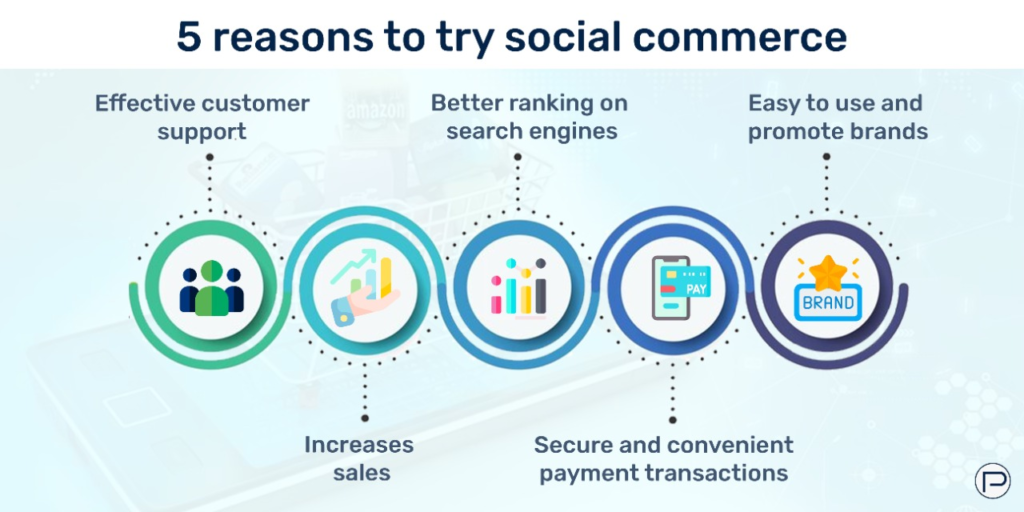The Indian social economy is in the throes of a revolution. This new form of commerce is revolutionizing retail and business and is set to grow rapidly- social commerce!. The allied industries that will be impacted by social commerce include logistics and warehouses, agri-tech, and omnichannel sales.
In India, social media has exploded in popularity in recent years, with companies establishing a presence on social media platforms to connect with their customers, solicit feedback and advertise new product launches.
Table of Contents
Social Commerce: Meaning and History
Social commerce is a phenomenon that has gained momentum in the Indian online space over the last few years. It has become an essential part of daily life for many people. Hence, it has become a crucial platform for eCommerce players to reach out to their targeted customers. Companies have begun establishing social media presence and engaging with their users to gather feedback and announce new product launches.
Initially, social media was thought of as a platform for marketers and brands to push content. Today, however, its use cases are much more diverse and varied. One such example is the way that Tesco uses Sprout Social technology to stock shelves based on what consumers are saying about their products. They then use the findings to filter the information back into the supply chain.
While social commerce has been used to spread information about products and brands, social media platforms are also used to convert users into customers. The biggest social media platforms, including Instagram and Facebook, enable eCommerce brands to create profiles and sell products through them. Additionally, Twitter has announced the beta test of a buy button on its tweets.
Social commerce has many benefits, including a ready-made audience. Social networks continue to grow every day, and each new user represents a potential new customer for brands. Ultimately, social commerce is all about giving consumers a personalized experience that satisfies their needs. It is also a great way to engage with brand ambassadors and regular people like yourself.
And if you’re looking for loyal customers and better brand reputation/awareness, social commerce may be exactly what you’re looking for.
5 reasons to try social commerce

The growing importance of social media for brands in India is undeniable. It connects people, provides insights into the social lives of people, and is an essential component of the online shopping transformation. In fact, every 9th customer turns to social media to make a purchasing decision. Moreover, three-fourths of these customers have purchased something after seeing it on social media.
Effective Customer Support
With social platforms, online store owners can directly engage with their audience and provide immediate assistance and answers to questions. This enables them to build a brand image and increase sales. Social media platforms also allow users to review their experiences and give feedback. That’s a huge advantage for a social commerce business, as word-of-mouth can work wonders for an eCommerce business.
Increases Sales
Many businesses use social commerce to connect with their customers and reach out to prospective clients. Consumers spend an average of over two hours each day on these platforms. The use of social media platforms allows brands to get detailed information on the preferences of shoppers. In-depth analysis reports and tracking tools can help a retailer decide on the items that will appeal to the most people. This means that social media platforms are highly efficient marketing tools. Given that these trends are expected to continue, including social commerce in your marketing plan appears to be a surefire approach to increasing sales.
Better Ranking on Search Engines
Social commerce has proven to enhance website visitors, which will likely affect how you rank on search engine results. Social media users can be effectively targeted by sharing links to your website’s content there. Additionally, it enables them to interact with you by leaving a comment, like, or sharing your content with others.
Secure and Convenient Payment Transactions
There are several options for payments through social media platforms, including UPI and e-wallets. Payments are processed through a trusted payment gateway, which is a huge advantage for online merchants. This allows them to focus on growing their business and offering consumers more value.
Easy to Use and Promote Brands
With eCommerce and social media merging, social commerce offers a powerful platform for sellers to reach consumers. Even if you don’t know much about social media marketing, you can get started by creating a brand page with engaging content, eye-catching photographs, and relevant hashtags.
Which social commerce platforms are the best?
Social media has become a hotbed for news and entertainment, but it can also be a lucrative marketing channel for eCommerce merchants. By incorporating social commerce into your website, you can increase customer engagement and earn authentic traffic. These platforms also offer a seamless shopping experience, allowing customers to buy products directly from brands. In addition, they give you the ability to respond to customer queries and questions in a short time.

Instagram’s intrinsic visual nature has given it an edge over many of its social media competitors. It has always been the ideal social media platform to showcase products, especially if you make an effort to make your photographs attractive.
Facebook is one of the most popular social commerce platforms. It has 562 million active users who use the Facebook Marketplace to look for local businesses. However, if you don’t offer the payment method that your customers prefer, they are likely to abandon their shopping carts. Fortunately, Facebook has a solution for this problem, called Facebook Pay. It stores credit card information and enables online retailers to accept payments through Facebook Messenger. This feature also allows retailers to monetize customer support requests made through Facebook Messenger.
Another advantage of social commerce is that it provides a ready-made audience for your brand. The number of users on social networks continues to grow every day. This means that every new user is a potential customer. To maximize this benefit, social commerce should be relevant to your firm. For example, a consumer may be interested in a specific type of product, which is a good way to ensure the right audience.
Snapchat
Snapchat is one social commerce platform that focuses on entertainment. It uses AR technology to create business opportunities from customer collaborations. Its AR lenses allow users to try on makeup, sunglasses, or even a suit without even visiting a store.
Pinterest is an excellent social commerce platform. The site features an intuitive search bar that allows users to browse products without leaving the platform. It also includes a shop tab on its homepage. This way, users can purchase products that were featured on the social media platform by celebrities, influencers, and brands. In addition to these two platforms, there are several other social commerce platforms that are worth considering.
Conclusion
Social commerce has become an important part of the e-commerce space in India. With an active monthly user base of 6 million, it has become a major source of growth for the sector. In addition, the popularity of social media has led to the development of new channels for direct engagement between buyers and sellers. This new medium is likely to transform the retail space in India. Get started with the integration of social commerce with your business! If you need assistance, you can reach out to us at info@paxcom.net.















